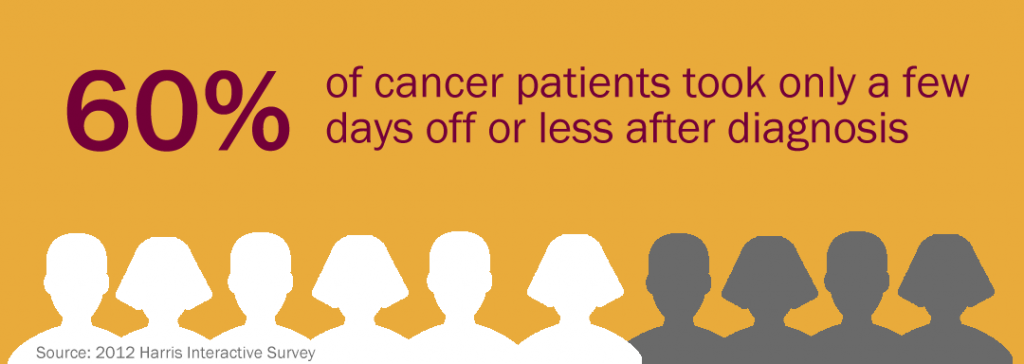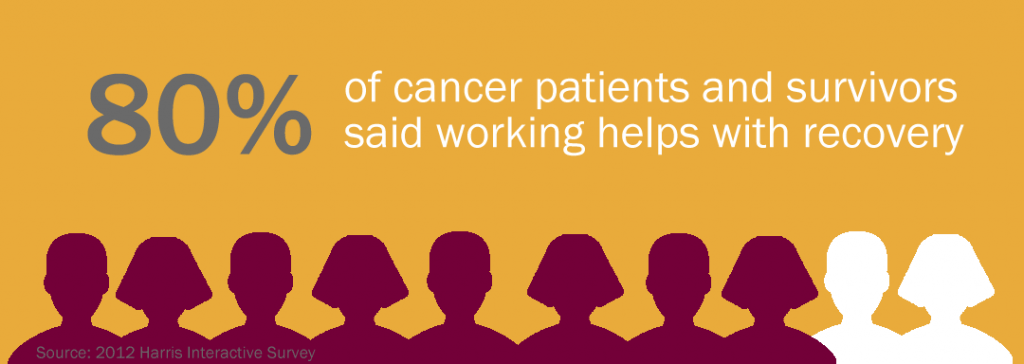While some cancer patients take time off from work, many simply can't afford to. It's common to find cancer patients still in the workforce to ensure their job's health insurance covers their treatments.

Source: According to a 2012 Harris Interactive Survey
Chemotherapy can be an arduous treatment: the debilitating fatigue, the nausea, the changes to your appearance. If you decide to continue working after your diagnosis, here's how to handle your job:
Tell your supervisors and co-workers that you've been diagnosed. Tell your boss first. Have a private meeting and tell him or her everything you feel comfortable sharing. Then, talk to human resources about how your job can accommodate your treatment schedule.
Lastly, find a time for both you and your boss to sit down and tell your coworkers. They may have helpful suggestions for treatment based on prior experiences, either personally or from a close friend or family member.
-Notify the people who depend on you about your treatment schedule. Let them know ahead of time when your doctor's appointments are and how your treatments might impact your ability to work.
-Organize a flexible schedule. Suggest decreasing your workload for the first few weeks, and if everything is fine, then continue working at the same pace. On days you feel especially sick, propose working from home or making up those days on weekends or holidays.
But what if my boss and co-workers want to replace me after finding out?
Here's a brutal reality: When some bosses find out an employee has cancer, they begin brainstorming about how to keep the workflow up. Sometimes that includes replacing you.
Fortunately, there are laws that advocate for you. If you live in a state that considers cancer a disability, the Americans with Disabilities Act (ADA) passed in 1990, prohibits discrimination against people with disabilities in the employment force, according to the U.S. Department of Labor.
Additionally, the Family and Medical Leave Act (FMLA) may protect your job for up to 12 weeks each year. You may have to take unpaid leave, but you should be able to keep your job's medical benefits.

What else can you do?
- Find out your company's policies regarding medical leave. Check with Human Resources first.
- Communicate everything in writing, even if you and your boss are friends. Keep a copy of any written records, instructions and conversations about how your illness and treatment will impact your job. If you talk in person, send a recap via email to make sure you have a record of the conversation in case any he-said-she-said issues come up down the road.
- Know your body's cycle. Cancer treatment is draining. One morning, you may feel fine, but some days you might be so exhausted that it feels like someone is pushing you into your mattress. Keep track of which days are better or worse during your treatment cycle. If you notice that you feel awful the day after a chemo treatment, but you're okay two days after that, work with your boss and your team to put you on the schedule when you feel strongest.
- If your boss is being unsupportive, reach out to your doctors to explain how your treatment is affecting your energy levels. Understand what the consequences could be to your health if you don't get proper rest.
- Reach out for help, whether from family, friends or co-workers. A support system might be your best asset. Besides emotional support, they can offer practical help, such as bringing work to you from the office or driving you to and from doctor's appointments.
There's nothing wrong with wanting to work while having cancer. If you're able, you have to do what is comfortable for you and best for your overall health.
$webqFacilityNumber
Need a Physician?